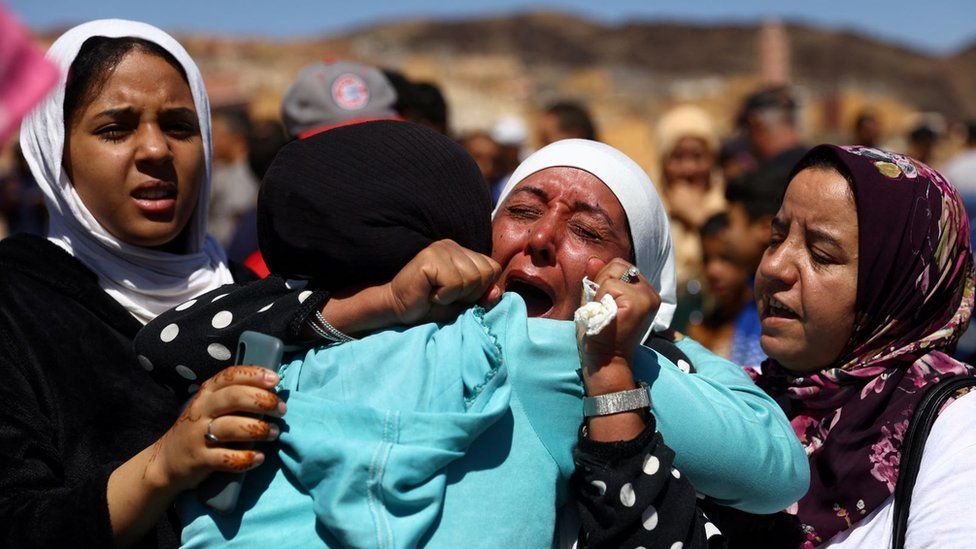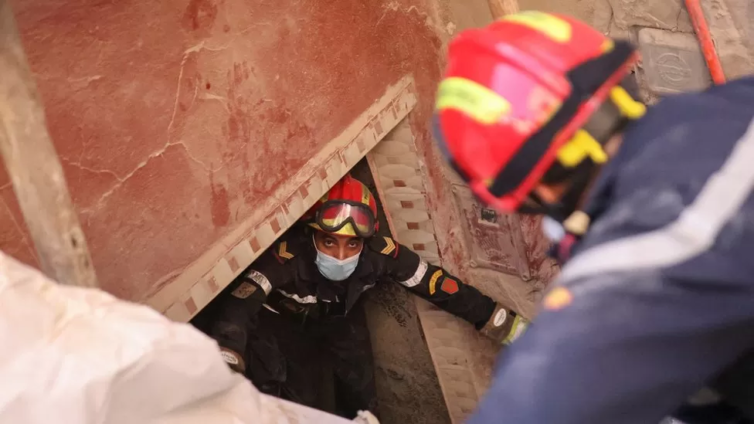Morocco faces a race against time to save those trapped under the rubble by Friday's earthquake, as emergency services battle to supply remote areas.
Villagers continue to dig by hand and shovel to find survivors, as response teams struggle to bring in machinery.
Those same tools may now be needed to prepare graves for some of the thousands killed in the quake.
People "have nothing left," a villager told the BBC. "People are starving. Children want water. They need help."
Friday's earthquake, the country's deadliest in 60 years, struck below a remote cluster of mountainous villages south of Marrakesh.
The government reported that at least 2,122 people were killed and more than 2,421 injured, many critically.
The 6.8-magnitude tremor collapsed homes, blocked roads and swayed buildings as far away as the country's northern coast.
Marrakesh's old city, a Unesco World Heritage site, suffered damage.
Morocco's King Mohammed VI declared three days of national mourning on Saturday, as the aftermath continued to unfold.
Civil protection units were deployed to increase stocks of blood banks, water, food, tents and blankets, the palace said.
But it conceded that some of the worst-affected areas were so remote that reaching them in the hours after the quake was impossible - the most crucial period for many of the injured.
Fallen rocks had partially blocked the already poorly maintained roads into the High Atlas mountains, the site of many of the worst-affected areas.

REUTERS
Many buildings have been reduced to rubble in the small town of Amizmiz, in a valley in the mountains about 34 miles (55km) south of Marrakesh.
The local hospital is empty and deemed unsafe to enter. Patients are instead treated in tents on the hospital grounds - but staff are overwhelmed.
A hospital official, who asked not to be named, said that around 100 bodies were brought there on Saturday.
"I was crying because there were so many dead people, especially the young children," he said. "Since the earthquake, I haven't slept. None of us have."
Beyond the hospital, the streets are packed with rubble from destroyed buildings, heavy traffic and those who have lost everything to the quake.
A woman wails in grief and is held by those around her.
There are more tents at the side of the roads for people who have lost their homes, but not everyone has them.
Dozens of people are sleeping on rugs laid on the ground in the central square.
Abdelkarim Brouri, 63, is one of those whose house partially collapsed and has nothing to protect him from the elements.
"I can't go back home," he said, pleading for more help. "We're helping each other. There's no help coming from outside."
"We used blankets to make a tent," said Ali Ait Youssef, another Amizmiz resident. "The tents the government distributed are not enough."
In a nearby village, crude graves covered with sticks and stones marked out some of the 100 residents killed.
Gravediggers were preparing more as locals said they had yet to receive any official support and were left to find and bury the dead themselves.
'Ready to deploy'
International efforts to aid the recovery have begun to increase in pace.
The UK said Morocco had accepted an offer to deploy emergency response teams, including rescue specialists, a medical team, search dogs and equipment.
Spain and Qatar have also said they received formal requests and would send search and rescue teams.
France said it "stood ready" to help but was awaiting a formal request from Morocco. "The second they request this aid, it will be deployed," said President Emmanuel Macron.
The US said "search and rescue teams ready to deploy... We are also ready to release funds at the right time."
Turkey, which suffered its own catastrophic quake in February that killed 50,000, had also offered but received no formal request.
A BBC reporter saw Spanish sniffer dogs in a village in the Atlas Mountains on Sunday.
Caroline Holt, of the International Federation of Red Cross and Red Crescent Societies (IFRC), told Reuters that the next "two to three days will be critical for finding people trapped under the rubble".
Meanwhile, relatives began to bury dozens of dead in the almost entirely destroyed village of Tafeghaghte, 37 miles (60km) southwest of Marrakesh.
"Three of my grandchildren and their mother are dead," said 72-year-old Omar Benhanna. "They're still under the debris. It wasn't so long ago that we were playing together."
In Agadir city, along the southern Atlantic coast, a woman named Hakima described how she fled her village, Msouna, after losing four relatives in the "catastrophic" shocks.
Neighbours pulled her out of the rubble, she said - but no aid had yet reached Msouna and nearby settlements.
"My family has lost their homes, their belongings - they have nothing left," she said. "People are starving. Children just want water. They need help."
Latest Stories
-
Former head of Central African football body jailed for war crimes
4 hours -
US clears way for $8 billion Paramount-Skydance merger
5 hours -
Female exec captured in viral Coldplay concert clip resigns
5 hours -
Arsenal sign defender Mosquera from Valencia
5 hours -
Debt restructuring programme was poorly structured – Finance Minister Ato Forson says
5 hours -
Mahama appoints fresh batch of ambassadors to key global capitals
6 hours -
Isak wants to explore move away from Newcastle
6 hours -
Benin names Spike Lee and wife ambassadors for African-Americans in the US
6 hours -
Trade deal on US tariffs within reach, says EU, as 1 August deadline nears
6 hours -
Trump bickers with Powell over Fed renovation costs
7 hours -
‘We will not default’ – Ato Forson assures bondholders as GH¢20bn DDEP payment plan unfolds
7 hours -
Take time to get VAT reforms right before scrapping COVID-19 levy – Prof. Asuming
7 hours -
France will recognise Palestinian state, Macron says
7 hours -
Foreign Affairs Ministry denies issuing Ghanaian passports to non-citizens
8 hours -
Uganda to host Asia/Africa play-off for 2027 Rugby World Cup
8 hours

